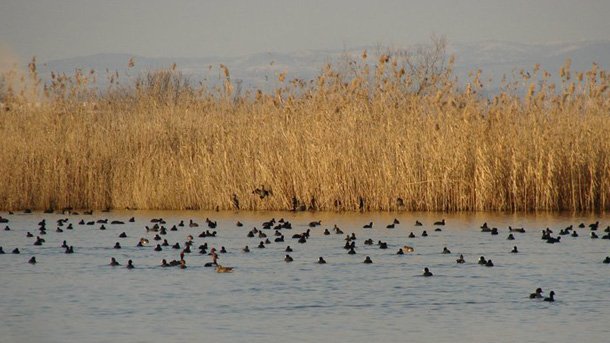Believe it or not, but one of the most unique with its birdlife places in Bulgaria and Europe is situated near the crowded port city of Burgas. It was named Poda after the rough wooden rafts pulled by ropes which once crossed the local lake to reach the salty waters of the marshy Black Sea bay. Poda Nature Reserve is situated over a land of 1 square kilometer only, but it combines huge diversity of habitats of over 250 bird species. Moreover, this is a damp zone which comprises of water basins with different salt content and birds can find food in abundance there. This is why Poda Reserve is rich in many bird species. The area is a paradise for the ornithologists and the tourists who arrive at this place each year to look at the birds.

Migratory flocks land to rest there each year. Those are the birds which cross the second largest migratory route in Europe-Via Pontica. This means that the whole European population of the pink pelican and the white stork cross this area. In 1989, the locality was declared a protected zone and the Bulgarian Society for the Protection of Birds has been taking care of it since then. Along with the protection of the bird species, the main goal of the environmentalists is to promote the locality as part of the Bulgarian natural heritage. This is why a special visitors’ center, where everyone can look into the world of the wild birds, was built. Many people take their children to the reserve during the summer holidays. The most regular visitors of the place are students who look at the birds with the curiosity of young explorers. Yana Gocheva is in charge of the educational activities with Poda Nature Reserve. She told RB that each season is different, because some birds depart from the reserve and other replace them. Some species found the reserve the perfect place to hatch for the first time this year.

“Now we hear only the sounds of the newly-hatched”, says Yana Gocheva. “They started to fly around their parents and learn how to feed and communicate. The sounds of the river kingfishers are loudest here. We built especially for them an artificial platform in front of the science center where tens of couples raised their little ones this year. Currently these birds are the most numerous ones in the region. The most-densely populated colony of the big cormorant which is unique for this country can be seen within the confines of the nature reserve. These birds usually nest over the old metal electric poles which are not in use at present. We call it Cormorant Neighborhood, because they resemble the Bulgarian concrete buildings with regard to the way of co-existence. The metal poles were not dismantled on purpose after they stopped functioning, because everyone here is concerned about the protection of the environment. However, the species called Platalea Leucorodia is the symbol of the Poda Reserve. These birds are exceptionally rare worldwide. They live in colonies along with the ibises and over 5 heron species. In fact, this is one of our ornithological sights, because you can not see anywhere else such a combination of seven heron species. The Himantopus himantopus Linnaeus for example is one of the most-friendly and interesting bird species here. This year they nested right under the balconies of our visitors’ center and we were lucky to watch the newly-hatched grow. Their feet are quite long and reach thrice the length of their body. They were a great attraction, but quickly grew up and flew away. Despite the massive flow of visitors, we tried not to disturb them too much, because the protected area is their home”, says Yana Gocheva.

A volunteer campaign is held at the Poda Nature Reserve each year. It aims at making the reserve a more comfortable and safer place for the birds. “Thus, new protected species can be welcomed to nest here”, says Yana Gocheva. With the help of the local power distribution company, the electric poles were made safe through special insulations and signaling devices so that the birds can be protected when they nest there.
A special attention was paid to the young visitors of the nature reserve. Just like other similar centers in Western Europe, wooden platforms were constructed this year in the reserve, where to the help of nets and magnifiers children catch the smallest spineless water inhabitants. “We help the students define those inhabitants which live in the waters of Poda Reserve and this provokes great interest in them”, says Yana Gocheva. The protected area is among the most-visited natural landmarks in this region, especially during the summer when tourists from the nearby coastal resorts come here.
English version: Kostadin Atanasov
Photos: Poda Nature ReserveSupposedly, the city of Kabyle that thrived in what is now Southeastern Bulgaria, was named after the Thracian Mother of Gods Cybele portrayed on the rocks of the Zaychi Vrah shrine. It was at the foot of this ancient astronomical..
First city, centre – that is the meaning of the name Pliska, which the founders of the First Bulgarian Kingdom gave to their capital in the 7 th century. They selected a location where major trade routes intersected, whereas the..
Samokov lies just 55 kilometers from Sofia and is best known for its proximity to the ski resort of Borovets. The people who have inhabited these parts through the ages have left abundant evidence – for example stone, wood and paper..

+359 2 9336 661
